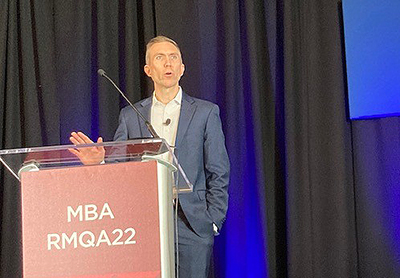
#MBARMQA22: When Good Fraud Investigations Go Bad

(Kip Mendrygal of Locke Lord LLP addresses MBA Risk Management, Quality Assurance & Fraud Prevention Forum in Nashville.)
NASHVILLE, TENN.—Kip Mendrygal, Partner with Locke Lord LLP, Dallas, says he’s seen a lot of weird stuff in his 20-plus years of investigating mortgage fraud.
“I think holding criminals accountable is critical for the real estate finance industry,” Mendrygal said here at the MBA Risk Management, Quality Assurance and Fraud Prevention Forum. “I see a lot of situations where if someone turns their back, the criminals come in high.”
Mendrygal said he’s seen a variety of criminal activity. “They try to blur the line between legal and illegal, but the law is pretty straightforward—fraud is fraud,” he said. “I’ve been amazed at how easy it is to create a fictional company with a fictional website, with a phone number that goes to their fictional friend Dave, who convinces you that everything is fine.”
The days of poorly created websites with typos and blurry logos are long gone, Mendrygal said. “Criminals have become more sophisticated,” he said. “They think it out, they plan it out, and they carry out the fraud. IDs, passports, tax documents, bank account statements and paychecks have become very realistic-looking.”
Mendrygal noted an uptick in foreign nationals moving money into the U.S. to invest in real estate. “They use straw buyers and other ways to hide their identity,” he said. “Some of it is legitimate—they might be celebrities or athletes who want privacy, or there might be country-specific restrictions on moving funds…remote is the new normal.”
And some bankers lie, too. “Many schemes benefit from participation by individuals other than the borrower,” Mendrygal said. “And if bankers participate from inside the castle walls, frauds can last longer and wreak more havoc. They have knowledge of company personnel, processes, terminology and vulnerabilities. They can leverage their relationships of trust and confidence.”
Why do they get involved? “Money,” Mendrygal said. “Sometimes they are sincerely trying to help unqualified borrowers find housing—but it’s really about the money. The good-hearted people are few and far between.”
Look for shifts from good times to lean times, Mendrygal noted. “A few years ago lenders had more loans than what to do with. Now we are seeing a more limited pool, and people who have been used to good times are looking at leaner times—and they want to keep the cash coming in.”
These kinds of fraud can be increasingly difficult to detect. “They are becoming more sophisticated,” Mendrygal said. “Insiders are not always caught; the smarter ones are using personal phones, personal email, third—party communications platforms to execute their schemes. If loans get quickly packaged and sold, it has limited visibility.”
However, Mendrygal said, law enforcement has become increasingly good as well. “We get a lot of help from you, but submitting reports,” he said. “When bankers lie, we see employees who choose not to participate, get disgusted, leave the company, and blow the whistle. Sometimes an employee changes their mind. When that happens, we come in.”
But law enforcement deals with a high standard of proof. “We have to have a case that is beyond reasonable doubt in order to secure a conviction,” Mendrygal said. “Our case has to be airtight. And we usually get a conviction.”
Mendrygal emphasized prosecution isn’t limited to individuals. “Business entities can be prosecuted and convicted just like individuals,” he said. “A business doesn’t serve prison time, but a plea or conviction can lead to fines, restitution, collateral consequences—i.e., loss of lines of credit or ability to do business with the government—an ongoing outside supervision.”
“Your work matters,” Mendrygal added. “When company insiders participate in a fraud, several of the corporate prosecution factors favor prosecuting the company. Don’t come to us half-baked—if you’re going to cooperate with us, cooperate fully. Remember law enforcement’s vast resources and discretion.”
A company’s corporate compliance program, Mendrygal said, is critical as to whether a prosecutor moves forward with prosecution. “Prosecutors determine whether the corporation’s employees are adequately informed about compliance and are convinced of the corporation’s commitment to it. This enables the prosecution to make an informed decision as to whether the corporation has adopted and implemented a truly effective compliance program that, when consistent with other federal law enforcement policies, could result in a decision to charge only the corporation’s employees and agents, or to mitigate charges or sanctions against the corporation.”
Mendrygal urged risk management professionals to ensure company infrastructure points internally as well as externally.
“Don’t overlook the possibility of insider fraud,” Mendrygal said. “I see a lot of compliance programs that are premised on fraud coming from outside the castle walls. You can’t afford to have it that way. You need to establish and unapologetically enforce your risk management policies; and you have to enforce discipline evenly across the organization—yes, even the revenue superstar.”
